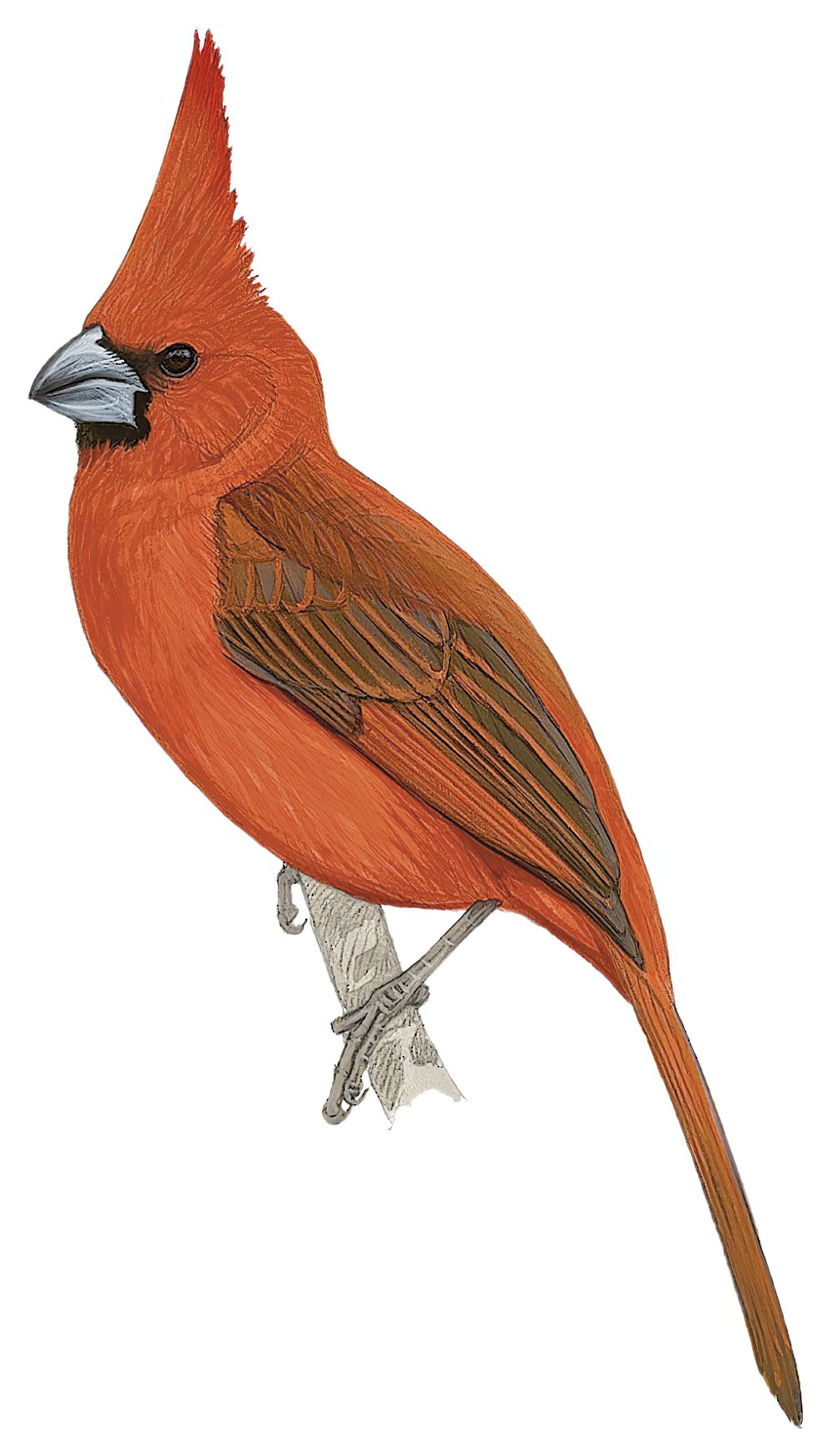Vermilion Cardinal / Cardinalis phoeniceus

Vermilion Cardinal
SCI Name:
Protonym: Cardinalis phoeniceus Proc.Zool.Soc.London(1837) (1837), Pt5 no.59 p.111
Taxonomy: Passeriformes / Cardinalidae / Cardinalis
Taxonomy Code: vercar1
Type Locality: 'the country south of the Bay of Honduras'' ; type from Venezuela, fide Hartert, 1919, Novit. Zool, 26, p. 155.
Author: Bonaparte
Publish Year: 1838
IUCN Status: Least Concern
DEFINITIONS
CARDINALIS
(Cardinalidae; Ϯ Northern Cardinal C. cardinalis) Specific name Loxia cardinalis Linnaeus, 1758. "Mercurialis affirms, that by the Portugues it is commonly called, The Cardinal bird, because it is of a scarlet (purpurei) colour, and seems to wear on its Head a red hat" (Ray 1678); "20. CARDINALIS VIRGINIANUS, Nob. C. ruber; gula et capistro nigris; cauda valde rotundata; rostro conico, subdentato. Hab. Throughout N. America. Finding in the collection of the Zoological Society two beautiful undescribed species of this my new form, I take this opportunity of making them known, especially as both come from Mexico. They all preserve the short rounded wings and lengthened tail, and even the crested head and red colours. As to the different shape of the bills, it is only an additional proof of the little importance to be attached to the form of that member in the conirostral birds. CARDINALIS PHŒNICEUS, Gould. ... A small but most splendid species, received by Mr. Gould from the country south of the Bay of Honduras. CARDINALIS SINUATUS, Nob. ... Hab. Western parts of Mexico." (Bonaparte 1838); "Genus 159. CARDINALIS, Nob. 233. CARDINALIS VIRGINIANUS, Nob. (Loxia cardinalis, L.) Aud. pl. 159. Southern parts." (Bonaparte 1838); "Cardinalis Bonaparte, 1838,2 Proc. Zool. Soc. London, 5 (1837), p. 111. Type, by subsequent designation (G. R. Gray, 1840, List Genera Birds, p. 43), Cardinalis virginianus Bonaparte = Loxia cardinalis Linnaeus. ... 2 Cardinalis Bonaparte is No. 1728 on the Official List of Generic Names in Zoology (Opinion 784, Bull. Zool. Nomencl., 23, pp. 201-209, 1966)." (Paynter in Peters, 1970, XIII, p. 220).
Synon. Pyrrhuloxia, Richmondena.
● (Thraupidae; syn. Piranga Ϯ Scarlet Tanager P. olivacea) Med. L. cardinalis cardinal, bishop < L. cardo, cardinis hinge, pivot.; "b. TANGARZYK. CARDINALIS. Tangara - Cardinal. Fran. ... n. p. Tanagra rubra. GL." (Jarocki 1821); "Cardinalis Jarocki, 1821, Zoologiia, II, p. 133. Type, by monotypy, Tanagra rubra Gm., i.e. Linnaeus, 1766 (not Fringilla rubra Linnaeus, 1758) = Tanagra olivacea Gmelin, 1789." (JAJ 2021).
cardinalis
Med. L. cardinalis cardinal, senior bishop of the Roman Catholic church who wears a scarlet cap and robes < L. cardo, cardinis hinge, pivot.
● "96. LOXIA. ... Cardinalis. 5. L. rubra, facie nigra. Chin. Lagerstr. 13. Cardinalis. Will. orn. 245. t. 44. f. 8. Coccothraustes capensis ruber, rostro hiante. Pet. gaz. 16. t. 16. f. 7. Coccothraustes rubra. Catesb. car. I. p. 38. t. 38. Frisch. ornith. I. t. 4. f. 1. Coccothraustes indica cristata. Alb. orn. I. p. 55. t. 57. & 3. t. 61. Aldr. orn. l. 16. c. 21. Raj. av. 85. Psittacus cristatus ruber. Seb. mus. I. p. 96. t. 60. f. 4. Habitat in America septentrionali." (Linnaeus 1758) (Cardinalis).
● ex “Lori Cardinal” of Hombron & Jacquinot 1845 (Chalcopsitta).
● ex “Sucrier Cardinalin” of Levaillant 1810, pl. 291 (Cinnyris artefact).
● ex “Lori d’Amboine” of d’Aubenton 1765-1781, pl. 518, “Lori cramoisi” of de Buffon 1770-1783, and “Crimson Lory” of Latham 1781 (syn. Eclectus roratus).
● ex “Cardinal Creeper” of Latham 1782 (It is doubtful whether this is the "Kuyameta" of Vieillot 1802 ("Héoro-taire kuyameta ...Le nom de cet oiseau est celui qu'il porte à l'île de Tanna" (Vieillot 1817))) (Myzomela).
● ex “Grand pic varié de l’isle de Luçon” of de Buffon 1770-1783, “Pic cardinal de l’Île de Luçon” of Sonnerat 1776, and “Cardinal Woodpecker” of Latham 1788 (unident. ?Chrysocolaptes sp?).
phoeniceum / phoeniceus
Gr. φοινικεος phoinikeos crimson, red, dark-red, purple.
● ex “Red-wing’d Starling” of Catesby 1731, and Albin 1731 (Agelaius).
UPPERCASE: current genus
Uppercase first letter: generic synonym
● and ● See: generic homonyms
lowercase: species and subspecies
●: early names, variants, mispellings
‡: extinct
†: type species
Gr.: ancient Greek
L.: Latin
<: derived from
syn: synonym of
/: separates historical and modern geographic names
ex: based on
TL: type locality
OD: original diagnosis (genus) or original description (species)












